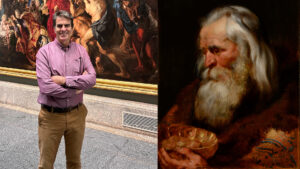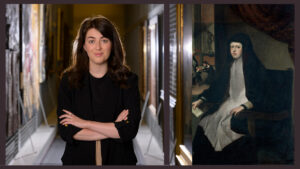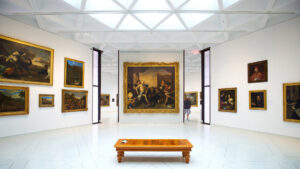Lecture
Josefa de Óbidos: A Woman Artist in Early Modern Iberia
Thursday, January 30 @ 6:00 p.m. – 7:00 p.m. CDT

Carmen Ripollés, Associate Professor, Portland State University
Josefa de Ayala (c. 1630–1684)—also known as Josefa de Óbidos, after the town in which she spent much of her life—was a seminal figure in Iberian Baroque art who achieved recognition and numerous commissions during her lifetime, and was one of the few independent, documented women artists from the period. Ripollés will discuss the Meadows Museum’s recent acquisition of her c. 1680 Still Life. Sponsored by the Custard Institute for Spanish Art & Culture. Seating is limited, advance registration required.
$10; free for members at the Individual/Goya Friend levels and up, and SMU students
Lecture
Rubens and Spain: For the Sheer Love of Art
April 10, 2025 @ 6:00 p.m. – 7:00 p.m. CDT
Free – $10

Alejandro Vergara, Senior Curator of Flemish and Northern European Paintings, Museo Nacional del Prado
This talk will focus on the art of Peter Paul Rubens (1577-1640) by way of the collecting of his paintings by the Spanish Royal Family. During the lifetime of the artist his homeland, the Southern Netherlands (what we now know as Belgium) was a part of the Spanish Monarchy, ruled by a Spanish princess, Isabel Clara Eugenia. She made Rubens her court painter and trusted diplomatic advisor. She also contributed to the taste for Rubens´s art of her nephew Philip IV, King of Spain: more Rubens paintings could be seen in his palaces in Madrid than in any other European city. This tale of art collecting allows us to consider the fascinating phenomenon of cultural diffusion. It is also an invitation to see with the eyes of Phillip IV. Rubens was the most successful painter in Europe during his lifetime. What did his art bring to the walls of the King´s palaces? Which are its virtues? What do his paintings bring to our lives still today?
$10; free for SMU students and Meadows Museum members at the Goya/Individual levels and above.
Lecture
From Queen Consort to Regent Widow: The Life of Mariana of Austria in Portraits
May 1, 2025 @ 6:00 p.m. – 7:00 p.m. CDT
Free – $10

Patricia Manzano Rodríguez, Curator, Meadows Museum
The portraits of Mariana of Austria (1634–1696) reveal more than just her likeness—they unveil the complex life of a queen who navigated political turmoil and personal loss. This lecture explores her life through key portraits, including Velázquez’s “Mariana of Austria” at the Meadows Museum and another from “The Sense of Beauty: Six Centuries of Painting from Museo de Arte de Ponce.” It examines how these works reflect her evolving roles as a monarch, providing insights into how her identity was shaped and immortalized through art.
$10; free for SMU students and Meadows Museum members at the Goya/Individual levels and above.
Lecture Series
Luis Martín Lecture Series in the Humanities
March 14, 21, 28, and April 4, 2025 @ 6:00 p.m. – 7:00 p.m. CDT
Free – $60

This four-part lecture series (March 14, 21 & 28, April 4) documents and investigates aspects of collecting art in four periods of European history: antiquity, the Middle Ages, the early modern period, and the eighteenth century. How are great private collections created? How does the study of those collectors and collections inform our understanding of the historical contexts of art? These are themes that are connected to the exhibition “The Sense of Beauty: Six Centuries of Painting from Museo de Arte de Ponce,” which features masterpieces from the collection of the industrialist and former governor of Puerto Rico Luis A. Ferré (1904–2003).
Who Owns the Past? Collecting Classical Antiquity
Friday, March 14 @ 10:30 a.m. CDT
P. Gregory Warden, Director, Custard Institute
From Monasteries to Mansions: American Collectors and Spain’s Medieval Legacy
Friday, March 21 @ 10:30 a.m. CDT
Cristina Aldrich, Center for Spain in America (CSA) Curatorial Fellow, Meadows Museum
Into Foreign Territory: The Rediscovery of Velázquez and Early Modern Spanish Art
Friday, March 28 @ 10:30 a.m. CDT
Patricia Manzano Rodríguez, Curator, Meadows Museum
Collecting Fragility: Porcelain in Eighteenth-Century Royal Collections
Friday, April 4 @ 10:30 a.m. CDT
Agnieszka Anna Ficek, Postdoctoral Fellow, Custard Institute
$60 for the series; free for SMU students and members at the Goya and Individual levels and above








